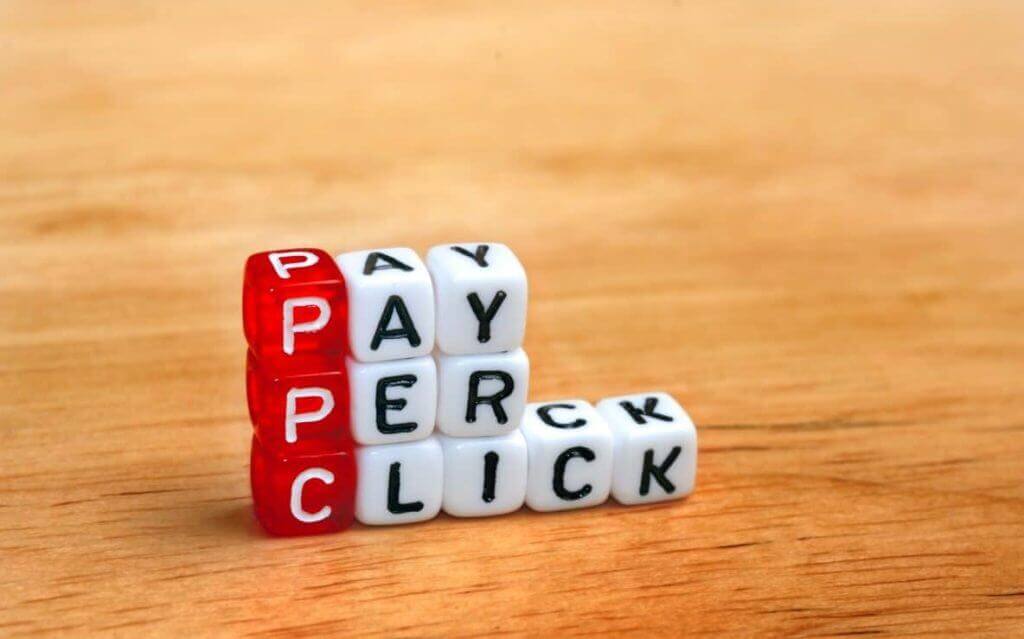
Many hoteliers and marketers are unsure of how to respond to the current crisis with regards to their digital marketing strategy. Demand is negligible and resources are low, so difficult decisions need to be made in order to protect the business and prepare for recovery.
NB: This is an article from Bookassist
The travel landscape has changed dramatically, both in the short and long term, so thinking needs to alter significantly to adjust to this new landscape. Paid digital marketing is no longer a binary choice of on or off; it is part of an overall ecosystem approach and needs to be seen as such, particularly as that ecosystem has become unbalanced.
In order to examine the place of paid advertising in this environment, we need to look at new and old assumptions to see which remain true and which need to be re-evaluated, while also looking at what actions need to be taken to help grow business again.
Probing Our Assumptions
Assumption 1
OTAs are no longer bidding on the brand name, so there is no need to spend on brand protection.
True or False? While it is true that OTA investment has been significantly curtailed, it has not stopped completely. Ads are still visible for brand queries in a number of areas, such as international markets with a long lead-in time and on less prominent search engines such as Microsoft Bing ( and by association sites such as Yahoo, DuckDuckGo and Ecosia). They are also advertising on brand terms that show intent eg. “hotel name + booking”. OTAs are extremely marketing savvy, so they are keeping a low-level presence based on the markets and segments they expect to recover first, with a view to increasing visibility as demand improves.
Figure 1 shows examples of a brand query searched on Bing, and also a search with booking intent, showing an ad for a less well-known OTA. It highlights the fact that while the big players have reduced advertising spend, this has created an opportunity for others to step in, as costs are now lower due to reduced competition.
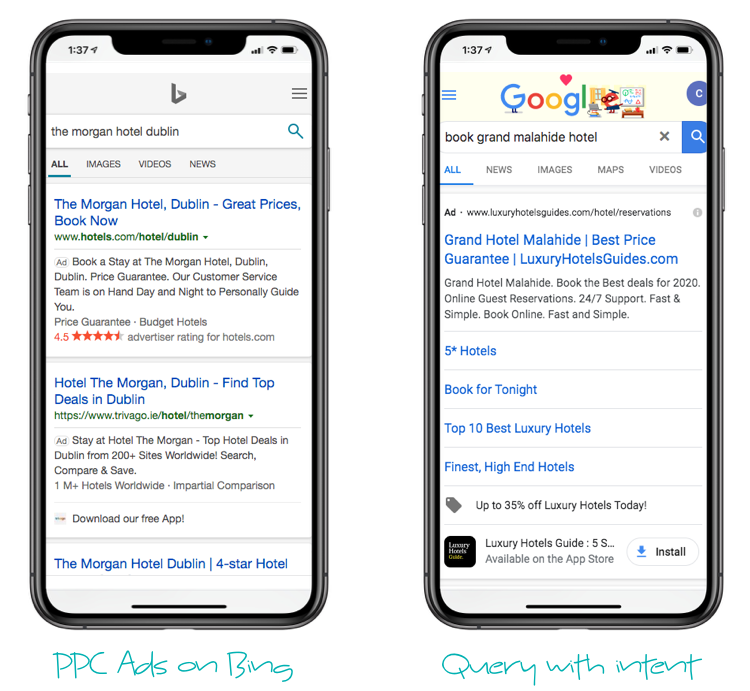
Equally important when looking at brand presence on the Google search page is the prominence of Google Hotel Ads. In the absence of PPC ads, Google Hotel Ads are now extremely prominent at the top of the page, particularly on mobile. This gives OTAs a high chance of capturing enquiries without the need to invest in PPC ads for brand queries. See image 2 below which shows Google Hotel ads dominating the first 2 screens of results on mobile. Having your brand PPC ad live will push Hotel Ads further down the page and increase the chances of a direct booking.
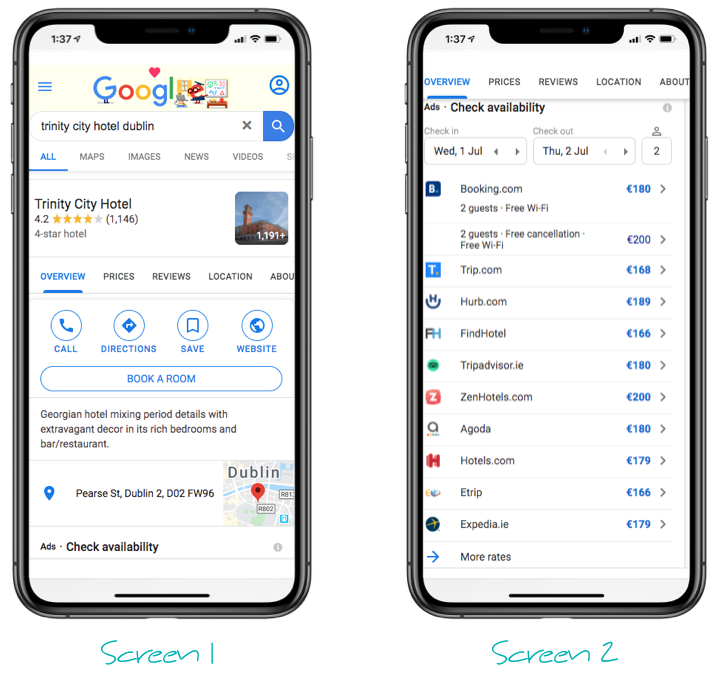
Historically, OTAs were far quicker to develop online presence and strategies than hotels, resulting in a huge share of business being diverted to them. It is important that hotels do not repeat this mistake again now that they have a real opportunity to do things differently – hotels can avoid handing the upturn to OTAs if they play their cards right.
Assumption 2
PPC is all about ROI, so there is no point in spending until bookings and revenue recover.
True or False? This limited view of PPC has become entrenched in recent years and misses the holistic impact of paid advertising on the business as a whole. New customers do not appear out of a void – they need to be exposed to your brand somewhere. It is therefore important for brands to take ownership of at least part of the customer journey in order to create awareness and influence. The decision matrix is growing increasingly complex, with many touchpoints along the way, so waiting until someone is on the verge of booking before engaging with that customer does not make business sense, as it reduces the likelihood of a direct booking.
There are two key factors to consider when generating new business from customers in the research phase. One is to ensure that they book your property rather than your competitors, and the second is to ensure that you get that booking at the lowest cost – through your direct channel. Now more than ever is time to play the long game. Invest in future bookings by engaging with potential customers now. Although search volume may be low (see Assumption 3 below), there is considerable interest in future bookings, so put your property in front of users now. Costs are minimal at the moment, but the future return could be significant.
These campaigns will not necessarily generate an immediate return on investment, but will put your property at top of mind when customers start to book in the future. Indeed some outliers with a long lead-in time are now generating more bookings than last year at a lower cost, as can be seen in Figure 3 below.
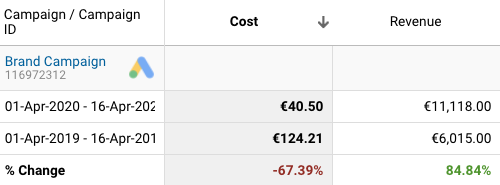
Investment on brand campaigns across our client base in April has fallen by 90% compared to last year, but despite the low demand, they are still seeing a return of 15 to 1, which combined with the long term benefits of advertising, makes a compelling case to continue investing, even at a low level.
It is also important to note that not all campaigns need to be focused purely on immediate room bookings. People are still making long term plans and thinking of the future, so if your property offers facilities for weddings or conferences, or has a strong corporate base, then you should be advertising to users who are researching now based on pent-up demand for events later this year, next year or later.
Assumption 3
Nobody is actively searching so there is no point in advertising.
True or False? Although hotel-related search queries have fallen significantly, with a drop of up to 85% (source: Google Travel Trends report), people are still interested in travelling in the future. Search volume is showing signs of recovery already, although different markets will recover at different rates, and searches will take some time to convert to actual bookings. Figure 4 below shows the search volume on Google in Ireland and Germany for ‘Hotel’ related queries in the last 12 months, with a slight uptick starting in mid-April 2020.
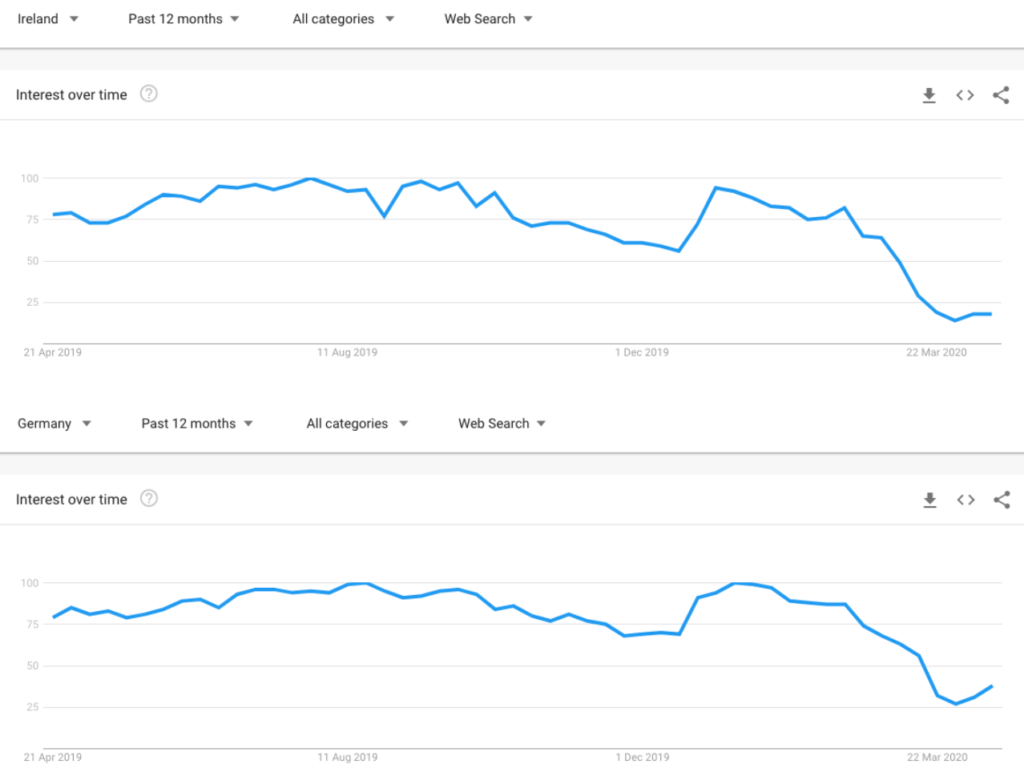
Source: Google Trends
Travel related searches may have fallen, but overall online activity has increased significantly, with people working, reading, researching, learning and communicating online more than ever. All of these activities provide an opportunity to reach new customers, whether through advertising on YouTube, the Google Display Network or Social Media. Remember that people are looking for distraction and something to look forward to, so the messaging should avoid a hard sell and be more about communicating at a personal level. Google has made this process even easier, with the recent introduction of the YouTube Video Builder, which helps create video from existing assets such as photos, text & logos, as well as financial assistance with the introduction of Covid-19 Ad Credits for SMBs.
There is an argument to be made that a portion of the current searches are ‘negative’ searches, eg customers searching for a phone number or cancellation details, but a well structured PPC campaign should already be filtering out unwanted queries through the use of negative keywords in the campaigns. These prevent ads from triggering when certain keywords are used – examples would include ‘directions’ or ‘contact’, to which new negative keywords can now be added. Another technique is to use remarketing lists for search – as well as targeting website visitors who have not yet booked, these lists can also be used to prevent ads displaying to guests who have previously booked through the hotel website. On balance the positive results from brand PPC campaigns far outweigh the small amount of budget that may be diverted to guests with no booking intent.
What next?
It is important to understand the changes that the current situation has brought about and use this time to regroup and to rethink your digital marketing strategy. Some key areas that need to be addressed include:
1. Know your customers
Different cohorts will respond very differently when restrictions are lifted and people can travel freely, so it is important to research your customer base and understand what they like, where they visit online, their demographics and how best to reach them. Some people will be keen to get away from it all in a remote hideaway, while others will want to see some nightlife and buzz in the city, so knowing your audience is vital to help address your targeting and messaging.
2. Targeting
This refers to 3 main areas: geographic, demographic and online behaviour. Recovery will come in different stages for different markets, but all indications are that it will generally happen in the domestic market first. Many people will be nervous to travel abroad initially, particularly given the additional risks involved with large crowds in airports and the close proximity of travellers on aeroplanes. So, geographically speaking, the main targeting should be on the domestic market, with a small amount for relevant international markets with long lead-in bookings.
Demographic targeting is more relevant on display and social media campaigns than on search, but it is important to segment customers wherever the opportunity arises. Ads should be targeted based on your customer research, so properties with a family base will need different targeting to a city-centre property with a younger demographic or a strong corporate base.
As with demographic targeting, online behaviour is more relevant for display and social media than for search campaigns, but is important to know where your customers go online. Targeting tools provided by Google Ads and other online advertising platforms will help with this, but this should be backed up with research that is unique to your property. When possible, talk to your guests and get to know their habits. Use tools such as Google Analytics to see what websites are referring customers to yours. Remember that the most valuable customers are those that already know you, so make sure that people who have previously visited your site are presented with your remarketing ads while browsing online, with one important caveat – make sure no-one sees your ad more than a few times a day.
3. Messaging
Your ad messaging and tone of voice should adjust to the current crisis and consumer needs, so instead of focusing purely on selling rooms, your ads on search engines, display or social media should also focus on your customers’ main concerns e.g. What steps you have taken to protect them if they do plan a future visit? Can they cancel or postpone without a penalty if circumstances change? Communicating these messages can help with customer confidence leading to improved conversion.
For customers who are not actively searching, you could create ads with a more informational message such as encouraging them to sign up to your newsletter, so they can be kept updated on your reopening and subsequent offers, or share updates & improvements to the property.
Social Media ads could also be a temporary substitute for regular organic posting. If you don’t have the capacity to create multiple new Facebook or Instagram posts, for example, creating one post and then boosting it, or creating a video or carousel ad can save a lot of time but amplify your message and generate good exposure at a relatively low cost. This will help maintain your share of voice until circumstances improve.
4. Budgets
Not all businesses are in a position to invest in PPC at the moment, but it should be seen as an important part of any recovery strategy. Brand search levels are low, so investment requirements are equally low, with typical monthly spends currently below €100. A good rule of thumb is to allow demand to dictate spend – as searches increase, investment should increase to match it.
If additional budget is available, reaching out to existing and new visitors through YouTube, Display & Facebook can also be done at a relatively low cost and lays the groundwork for a speedier recovery than would otherwise be the case.
Conclusion
It is important to maintain some level of visibility throughout this crisis in order to connect with customers and keep them informed. A small investment now will pay dividends in the long term and should be seen on an equal footing with other standard investments such as stocking up on supplies or paying for utilities. As demand slowly increases, the messaging can change to match the environment and budgets can be adjusted to meet that demand. Start with your local market and expand as people begin to travel more.
Moving away from an ROI model is important to help understand online advertising as part of an overall recovery plan, particularly when looking at softer metrics such as newsletter sign-ups or social media shares.




